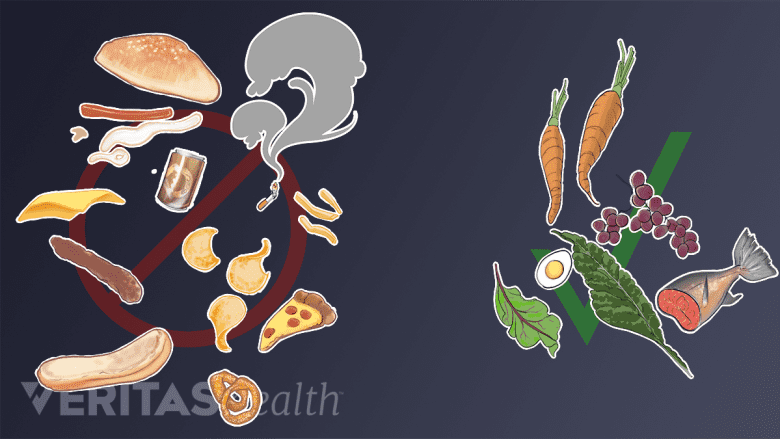Sensitivity to pain is a well-known symptom of fibromyalgia. A lesser-known symptom is an enhanced sensitivity to various substances, including food.

Inflammation causing foods can make symptoms of fibromyalgia worse.
Following an anti-inflammatory diet and being aware of food sensitivities can help people with fibromyalgia get the most out of their food while avoiding symptom flare-ups.
In This Article:
- Food and Fibromyalgia: What to Know
- Foods to Avoid with Fibromyalgia
- How to Create a Fibromyalgia-Friendly Diet
- Ingredients That May Trigger Fibromyalgia Symptoms
Foods Likely to Make Symptoms Worse
The following foods may worsen symptoms by increasing inflammation, aggravating food sensitivities, or both.
-
Sugar. Reducing or eliminating sugar can have a significant impact on health for two reasons. First, the medical literature has shown that eating foods high in sugar is linked to increased fibromyalgia pain.1Timmerman GM, Calfa NA, Stuifbergen AK. Correlates of body mass index in women with fibromyalgia. Orthop Nurs. 2013;32(2):113-9.
Second, limiting sugar helps control weight. Being overweight puts extra stress on the body, contributing to fatigue, and stored fat may lead to inflammation in some cases. Sugar is a well-known ingredient in candy and soft drinks, but is also in foods considered to be healthy—such as yogurt. When checking nutrition labels, it is helpful to know that glucose, fructose, and sucrose are other names for sugar.
-
Carbohydrates. Refined carbohydrates such as cookies, many breads, pastries, and white rice are digested quickly, causing blood sugar levels to spike. The effect does not last, however, and blood sugar soon drops, making the individual hungry again. These fluctuations can make the fatigue and pain of fibromyalgia worse and contribute to overeating.2Ernst A, Shelley-Tremblay J. Non-Ketogenic, Low Carbohydrate Diet Predicts Lower Affective Distress, Higher Energy Levels and Decreased Fibromyalgia Symptoms in Middle-Aged Females with Fibromyalgia Syndrome as Compared to the Western Pattern Diet. Journal of Musculoskeletal Pain. Volume 21, 2013, Issue 4. Page 365-370. dx.doi.org/10.3109/10582452.2013.852649.
When eating carbohydrates, whole wheat sources should be chosen. Whole wheat foods digest more slowly, avoiding the highs and lows that occur with other carbohydrates.
See Celiac Disease and Low Thyroid vs. Fibromyalgia
One small research study focused on women diagnosed with fibromyalgia who also had irritable bowel syndrome (IBS) and a food intolerance. (Many people with fibromyalgia also have irritable bowel syndrome.)
When the women cut back on eating a specific group of carbohydrates, they reported a 50% reduction in irritable bowel symptoms and a 22% decrease in other symptoms, including pain. The restricted carbohydrates were a type not well absorbed in the small intestine. Such carbohydrates include lactose (an ingredient in milk and other dairy foods), fructose (in some fruits and vegetables, honey, and other sweeteners), and grains.3Maruma AP, Moreirab C, Saraivaa F, Tomas-Carusc P, Sousa-Guerreiroa C. A low fermentable oligo-di-mono saccharides and polyols (FODMAP) diet reduced pain and improved daily life in fibromyalgia patients. Scandinavian Journal of Pain. Volume 13, October 2016, Pages 166–172. dx.doi.org/10.1016/j.sjpain.2016.07.004.
- Processed foods. Sugar and unhealthy fats, which increase inflammation, are a large part of many processed foods. Flavorings and preservatives commonly used in processed foods also may trigger food sensitivities.
- Unhealthy fats. Vegetable oils, such as corn oil, safflower oil, and peanut oil, have an inflammatory effect, especially when used to fry food. The medical literature has linked fried foods to worsening of fibromyalgia symptoms.1Timmerman GM, Calfa NA, Stuifbergen AK. Correlates of body mass index in women with fibromyalgia. Orthop Nurs. 2013;32(2):113-9. Unhealthy oils are a common ingredient in many processed foods, such as cookies, doughnuts, and crackers. Pizza and cheese are also major sources of unhealthy fats.
- Alcohol. While some research has found moderate alcohol use can ease symptoms,4Kim CH, Vincent A, Clauw DJ, et al. Association between alcohol consumption and symptom severity and quality of life in patients with fibromyalgia. Arthritis Res Ther. 2013;15(2):R42. some people with fibromyalgia report alcohol causes symptoms to flare. Drinking alcohol while taking certain medications prescribed for fibromyalgia—such as anti-convulsants, antidepressants, and acetaminophen (an ingredient in many medications) could cause harmful interactions.
This is not a comprehensive list of foods that may trigger symptoms. Other foods and ingredients that may cause symptoms for some people include, but are not limited to:
- Gluten
- Red meat
- Fruits and vegetables in the nightshade family, such as tomatoes, white potatoes, green peppers, and goji berries.
- Dairy products
- Eggs
- Caffeine
Learning About the Body's Reaction to Certain Foods
If a food appears to trigger symptoms in an individual, eliminating the food entirely for several weeks is a good way to determine its impact. Keeping a detailed food log to track symptoms when the food is removed and added back may also be helpful.
Reducing sugar and sugary foods can have an additional benefit, helping the individual overcome a craving for sweets for the long term.
The doctor can be a good resource on food sensitivities and should be informed of problems encountered with different foods and ingredients. In some cases, the doctor may suggest testing for food sensitivities or allergies to narrow the list of potential problem foods.
- 1 Timmerman GM, Calfa NA, Stuifbergen AK. Correlates of body mass index in women with fibromyalgia. Orthop Nurs. 2013;32(2):113-9.
- 2 Ernst A, Shelley-Tremblay J. Non-Ketogenic, Low Carbohydrate Diet Predicts Lower Affective Distress, Higher Energy Levels and Decreased Fibromyalgia Symptoms in Middle-Aged Females with Fibromyalgia Syndrome as Compared to the Western Pattern Diet. Journal of Musculoskeletal Pain. Volume 21, 2013, Issue 4. Page 365-370. dx.doi.org/10.3109/10582452.2013.852649.
- 3 Maruma AP, Moreirab C, Saraivaa F, Tomas-Carusc P, Sousa-Guerreiroa C. A low fermentable oligo-di-mono saccharides and polyols (FODMAP) diet reduced pain and improved daily life in fibromyalgia patients. Scandinavian Journal of Pain. Volume 13, October 2016, Pages 166–172. dx.doi.org/10.1016/j.sjpain.2016.07.004.
- 4 Kim CH, Vincent A, Clauw DJ, et al. Association between alcohol consumption and symptom severity and quality of life in patients with fibromyalgia. Arthritis Res Ther. 2013;15(2):R42.

